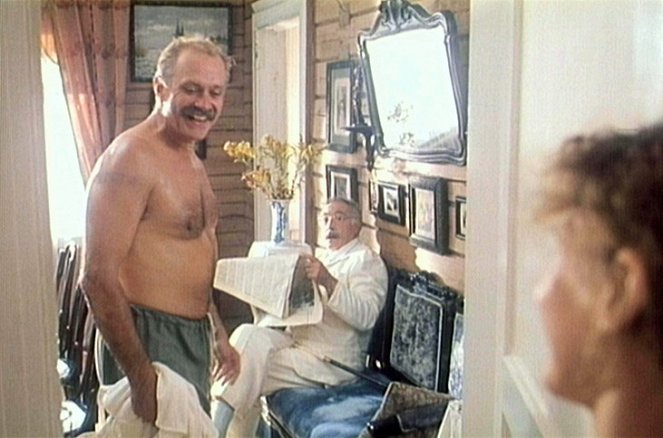Directed by:
Nikita MikhalkovCinematography:
Vilen KalyutaCast:
Oleg Menshikov, Nikita Mikhalkov, Ingeborga Dapkunaite, Nadezhda Mikhalkova, Vjačeslav Tichonov, Svetlana Kryuchkova, Vladimir Ilyin, Alla Kazanskaya (more)Plots(1)
A long summer day in 1936. Colonel Kotov, an aging military hero of the Bolshevik revolution, is enjoying the sweet life in his country house, together with his captivating young wife Maroussia, their six-year-old daughter, and numerous family members and friends. Into this idyllic setting enters Dimitri, a young man who was Maroussia's lover a decade ago, before leaving under mysterious circumstances. Dimitri now works for Stalin's secret police, and it becomes clear that he has returned with an agenda. (official distributor synopsis)
(more)Reviews (7)
This film won me over years ago. What I enjoy most about it is the brutal contrast of the relaxed summer idyll with the harsh reality of Stalin's purges, the perfect atmosphere, and the three outstanding performances by Oleg Menshikov, Nikita Mikhalkov, and Nadezhda Mikhalkova. I've said many times how I feel about children in film, but Nadia gave a truly excellent performance as Nadia, albeit mightily supported by her daddy/co-actor/director/screenwriter.
()
When I first saw the film in the 1990s, it had a profound effect on me. Today, however, I am a little disappointed with it. I'm not saying it's a bad movie, but it's not worthy of the adoration I felt at the time. Nevertheless, I think it is one of the key works of Russian cinema, so it is worth paying attention to. In particular, I never cease to be fascinated by the alarming contrast between the carefully drawn rural idyll full of poetry and the final dramatic sequence of events. (85%)
()
Even though the film has a slow pace, you definitely don't feel like nothing is happening. It's as if it's all heading towards something big, and given the peaceful development, you'll get the feeling that that something big won't be very pleasant. It beautifully captures human nature and human qualities, but also landscape and tranquility in contrast to something lurking in the background.
()
In the end, a brilliant indictment of the Stalinist purges in the Soviet army of the late 1930s. At the beginning the film deceives with its body, Michalkov lulls the viewer with a plethora of humorous situations and the depiction of Colonel Kotov's idyllic family life, only to grab them by the throat at the end and strangle them with a demonstration of the practices of NKVD agents. Michalkov and Imbragimbek's film is both kind and terrifying, and the Oscar is in the right hands. And what I would also like to highlight are the performances of all the actors involved, especially Michalkov himself and his real daughter Nadezhda, who is absolutely disarming with her immediacy, as if standing in front of the camera is the easiest thing in the world.
()
When I first saw the film 20 years ago, it deeply impressed me and I gave it the highest rating. However, repetition is the mother of wisdom, and today I have different standards, and so I noticed some flaws I missed the first time. The film is overly drawn out and could benefit from more prominent editing. Shortening the film by 20 minutes would definitely not mean depriving the viewer of anything essential, especially in the middle part where the drama really gets drowned in dialogues. Once I thought that Michalkov was playing with the viewer and keeping them in suspense for a very long time, yet now it seems to me that he reveals unnecessarily too much and that the film could have been better treated dramaturgically to deliver a sudden blow, so to speak. Also, Michalkov's fondness for melodrama and sentiment is occasionally excessive, although these are minor flaws in its beauty. Finally, in retrospect, Michalkov's political views are also evident here, which would fit perfectly into the era of perestroika, as a kind of critique of Stalinist excesses, without touching the legendary legacy of the Bolshevik revolution and questioning traditional Russian authoritarianism. On the other hand, the acting trio of Menshikov, Michalkov, and little Nadezhda Mikhalkova constantly keep the film above average. Michalkov also knows how to create beautiful images of the era's society, and in the last third, when the NKVD comes into play, the film gains a truly chilling atmosphere. For Russian society, where Stalin still represents an unquestioned authority and the symbol of the Russian empire, this is a much-needed film with a strong artistic statement about the cruelty of the time, despite my aforementioned reservations. Overall impression: 85%.
()


Ads